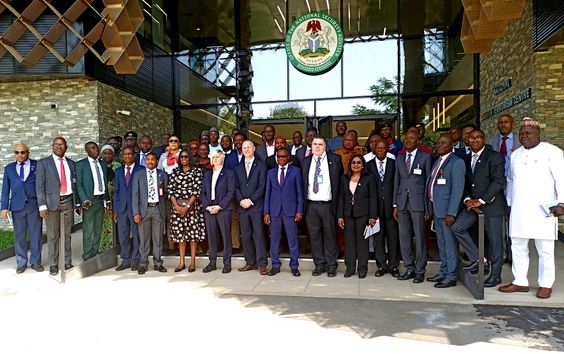Security & Crime
Nigeria and UK discuss the risks of drones to aviation safety

A workshop was held on Tuesday by the National Counter Terrorism Centre (NCTC) to examine the risks that terrorists and drones pose to aviation security.
The Department for Transport of the UK Government collaborated with us to organise the training with the theme “Aviation Threats and Counter-Drone Threat.”
The programme aimed to enhance the operational and technological capabilities of aviation stakeholders in order to effectively detect and respond to acts of terrorism against air transportation, according to retired Rear Adm. Yaminu Musa, the National Coordinator of the centre.
He noted that this was significant since a nation’s sense of risk is frequently linked to the security of its maritime and aviation sectors.
Musa went on to say that the effects of terrorism on domestic travel have a severe detrimental influence on a nation’s social, cultural, and economic advancement.
For example, the effects of terrorism on the travel and tourist sector can result in homelessness, unemployment, deflation, and a host of other negative social and economic outcomes.
“Traffic networks are especially vulnerable, as terrorist and violent extremist groups have targeted ships, aeroplanes, and other modes of transportation,” past experiences have demonstrated.
“Transportation networks and tools have been weaponized by terrorists and their allies to carry out terrorist attacks.
In order to successfully prevent and respond to terrorist activities against air transport, he said, “it is imperative to sensitise and build the operational and technical capacities of aviation stakeholders through targeted engagements like this workshop.”
According to the NCTC coordinator, no nation or organisation can successfully combat terrorism on its own.
He stated that since terrorism “recognises no borders,” interagency cooperation and cross-border partnerships are essential in the battle against it.
READ ALSO: FG warns: US about potential negative impact of travel advisory on foreign investment in Nigeria
The goal of the workshop, according to him, was to get the government, non-governmental organisations, and well-meaning Nigerians to deliberately take aviation security more seriously, with a focus on pertinent counterterrorism actions and specifics.
He claims that the session will also cover the risks to national security that come with drone abuse.
Unmanned aerial vehicles, or UAVs, are now employed as modern weaponry in addition to being means of reconnaissance. Drones are now a weapon and have altered the nature of warfare, particularly in low-intensity battles.
“Drone proliferation is inevitable due to its ever-evolving uses and growing interest in acquisition.”
In order to boost aviation security, the coordinator stated that it was critical for stakeholders to collaborate in order to develop strong and proactive solutions to offset these unfavourable difficulties.
“We will have the chance to learn from eminent experts, participate in thought-provoking discussions, and investigate creative solutions to counter the drone threat to aviation over the course of this three-day workshop,” he continued.
As a result, Musa pushed the attendees to actively participate in the talks in order to obtain insightful information and experience, promote fruitful interagency cooperation, and create useful ideas to improve aviation security.
In his speech, Mr. Jon Kendall, the UK First Secretary for Aviation Security for Nigeria, Ghana, and Algeria, stated that international cooperation was the most effective means of addressing the threat to civil aviation.
Because terrorists have no regard for national boundaries, Kendall stated that there is a worldwide threat from terrorism and that the workshop will include lessons learned from the different instances that have occurred in the UK.
Although the UK would not claim to be flawless in the field of aviation security, he added that it had learned its lessons the hard way through a number of situations involving drones and how to deal with them.
